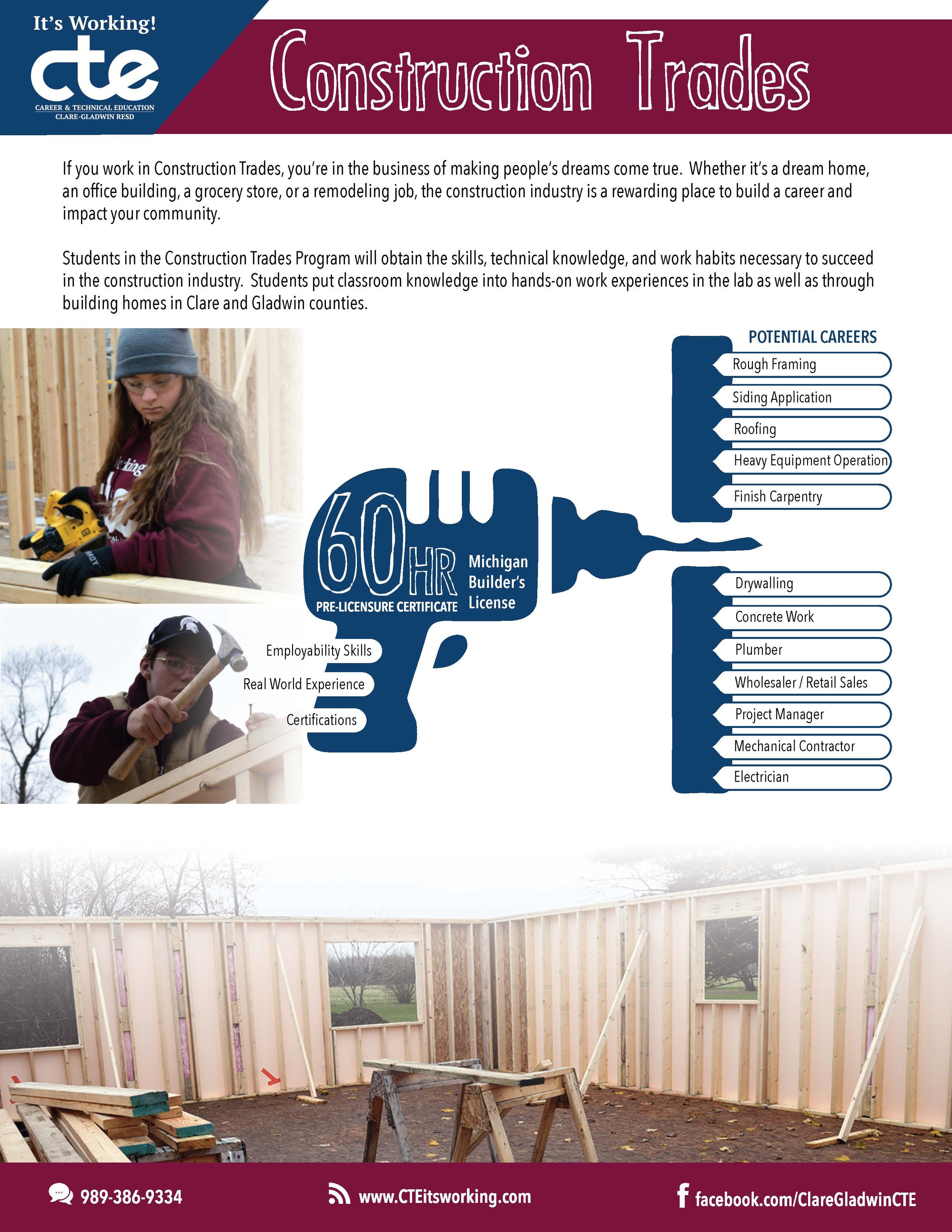Construction Trades
Pick up the tools to build your dream career.
If you work in Construction Trades, you’re in the business of making people’s dreams come true. Whether it’s a dream home, an office building, a grocery store or a remodeling job, the construction industry is a rewarding place to build a career - a growth area where the compensation is good to excellent.
Course Overview
Students will obtain the skills, technical knowledge and work habits necessary to succeed in the construction industry. Students put classroom knowledge to work through hands-on activities in the lab and at the project house. Learning activities allow students to become knowledgeable in fundamental principles and methods of construction and to develop technical skills related to carpentry, electrical, plumbing, masonry and finish work. Instruction includes safety principles and practices; recognition of standard lumber sizes; foundation layout methods; building concepts and procedures; local, state and national codes; cost estimating; and blueprint reading. The curriculum focuses on familiarization with safety practices and the proper use of both hand and power tools. Instruction is provided in theories and techniques used in the construction field.
Learning Environment
Time is spent in the classroom and the lab learning to safely operate equipment. The class builds project houses in partnership with Gladwin County Land Bank Authority. At the beginning of the school year, the class will start with a bare lot; by the end of the school year, we’ll have built a home.
Is it for me? It is if you…
...are good at math/science
...are organized
...work well as a team member
...like to build things
...are detail-oriented
...understand measurements
...can accept responsibility
...are mechanically inclined
...are good at problem solving
What’s It Like?
Instructor Josh Myers says: “The course is primarily hands-on learning and requires a great deal of mathematics. A student with previous experience in woodworking or a Wood Shop class would be ideal. Daily attendance, self-motivation and the ability to work well with others are a must. Work in trades is physical and may occur under adverse weather conditions.”
Potential Careers
Participation in Construction Trades can help prepare you for jobs in areas like:
Rough Framing
Siding Application
Roofing
Heavy Equipment Operation
Finish Carpentry
Drywalling
Concrete Work
Countertop Installation
Wholesaler/Retail Sales
Tile Installation
Cabinet Installation
Program Schedule:
A.M. Session - 8:30 a.m. - 10:30 a.m.
P.M. Session - 12:15 p.m. - 2:30 p.m.
Primary Units of Instruction
(lecture, demonstration and lab work):
Materials
Roofing
Estimating
Drywall
Work Ethics
Insulation
Tool/Equipment Usage & Safety
Foundation Building
Cabinet Installation
Blueprint Reading
Finish Carpentry
Construction Code
Green Build
Alternative Energy
Length of Program:
One Year, two semesters; second year is optional for qualified students
Going to college? Start with CTE
It is possible to earn articulated college credit through an articulation agreement between CTE and many Michigan community colleges and universities. This credit can only be granted after successful completion of the CTE program and future enrollment at a college or university that has a current articulation agreement with Clare-Gladwin CTE. See your school counselor for more information.
College Partnerships
Delta College
Students in Construction Trades also have the opportunity to earn the State of Michigan 60-Hour Pre-Licensure certification.
Who’s Up For a Second Helping?
Students interested in returning for the program’s second year must:
Have 10 or fewer absences and fewer than three tardies in the second semester of Year One
Have a ‘C’ average or better each semester
Be an effective and collaborative team member, stay on task, have good work ethics and maintain safety requirements
Complete classroom requirements
High School Credit and CTE Certification
Students may earn the state-required fourth-year math-related course credit through this program. Local schools will award high school credit upon successful completion of this program. The CTE Certificate of Completion will be awarded to students who successfully complete their programs.







